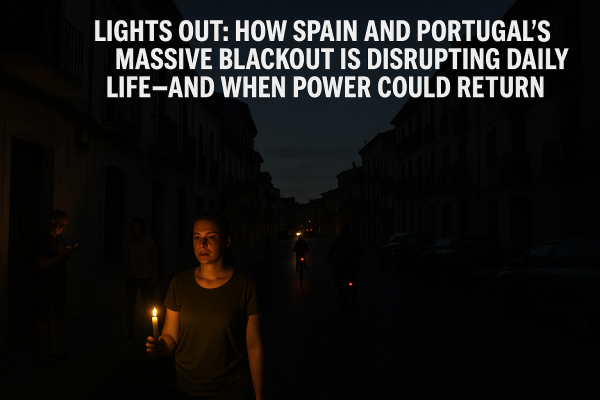Lights Out: How Spain and Portugal’s Massive Blackout Is Disrupting Daily Life—And When Power Could Return

Lights Out: How Spain and Portugal’s Massive Blackout Is Disrupting Daily Life—And When Power Could Return
A sudden, sweeping blackout left millions across Spain and Portugal in the dark this week, crippling transit systems, shuttering businesses, and raising urgent questions about Europe’s energy resilience. As one of the region’s most severe power failures in decades unfolds, residents and officials are scrambling to adapt—and demanding answers. Here’s what we know about the crisis, its ripple effects, and when normalcy might return.
The Blackout’s Ground Zero: What Sparked the Crisis?
The outage began in the early hours of Tuesday morning, triggered by a cascading grid failure that started near Spain’s northern Basque Country. While initial reports pointed to extreme heat straining power lines, investigators later identified a critical malfunction at a substation in Bilbao as the primary culprit. Portugal’s interconnected grid—which relies heavily on Spanish energy imports—was dragged into the chaos minutes later.
“This wasn’t just a technical glitch; it’s a wake-up call,” said María López, a Barcelona-based energy analyst. “Decades of underinvestment in grid maintenance, combined with rapid renewable energy integration, have left our infrastructure vulnerable.”
Daily Life Upended: From Hospitals to Highways
The human toll of the blackout is mounting. Key impacts include:
- Healthcare Emergencies: Backup generators failed at multiple hospitals in Lisbon and Madrid, forcing delays in surgeries and patient transfers.
- Transportation Chaos: Metro systems in Barcelona, Porto, and Valencia halted mid-route, while airports operated at reduced capacity.
- Economic Standstill: Small businesses without generators—especially restaurants and retailers—lost days’ worth of revenue. Barcelona’s famed La Boqueria market temporarily closed, impacting 200+ vendors.
In rural areas, farmers faced irrigation system failures, threatening crops during a critical growth period. “No power means no water pumps,” said Andalusian olive grower Carlos Mendez. “If this lasts much longer, we’ll see harvests collapse.”
Economic Fallout: A Blow to Tourism and Trade
Spain and Portugal’s economies, still recovering from pandemic-era losses, are taking a direct hit. Key sectors affected:
- Tourism: Hotels in coastal regions like the Algarve and Costa del Sol reported mass cancellations as air conditioning systems failed during a heatwave.
- Manufacturing: Automotive plants in Valladolid and Porto shut down, disrupting supply chains for European automakers.
- Energy Markets: Spot prices for electricity in Spain surged by 300% on the European Energy Exchange, sparking fears of inflation.
Analysts estimate losses could exceed €2 billion if the outage persists through the week.
Public Outcry: Frustration Boils Over
Social media has erupted with anger under hashtags like #ApagónIbérico (“Iberian Blackout”), as citizens criticize sluggish government response. Protests erupted in Madrid on Wednesday, with crowds chanting, “Luz ahora!” (“Lights now!”).
Meanwhile, conspiracy theories about foreign cyberattacks and renewable energy “weakness” have flooded online forums. Officials have dismissed these claims, urging patience. “We’re working around the clock to restore power,” said Spanish Energy Minister Teresa Ribera. “But repairs must be methodical to prevent further damage.”
When Will the Lights Come Back On?
As of Thursday, 65% of Spain and 40% of Portugal have regained power, but rural regions remain dark. Energy providers warn that full restoration could take until early next week, citing three hurdles:
- Grid Complexity: Engineers must manually inspect thousands of miles of lines to avoid reigniting failures.
- Heatwave Complications: Temperatures above 100°F (38°C) are slowing repair crews and increasing demand as systems come online.
- Resource Shortages: Replacement parts for aging infrastructure are in limited supply across Europe.
Meteorologists predict cooler weather by Sunday, which could ease pressure on the grid.
Long-Term Implications: A Catalyst for Change?
The blackout has reignited debates about Europe’s energy strategy. Spain, which generates 50% of its power from renewables, now faces scrutiny over grid storage capabilities. “Solar and wind are vital, but we need batteries and modern transmission lines to handle fluctuations,” said Lisbon energy consultant Hugo Silva.
EU officials are urging member states to audit power systems, while Spain’s government vows to fast-track a €4 billion grid modernization plan. For now, though, the focus remains on surviving the crisis—and preparing for the next one.
The Takeaway for Americans
While the Iberian blackout feels distant, it underscores vulnerabilities in any nation’s energy infrastructure. As climate change intensifies and grids age, even affluent regions aren’t immune to collapse. For U.S. readers, the crisis is a stark reminder: Investing in resilient, diversified energy systems isn’t optional—it’s essential.
Stay tuned for updates as this story develops.




